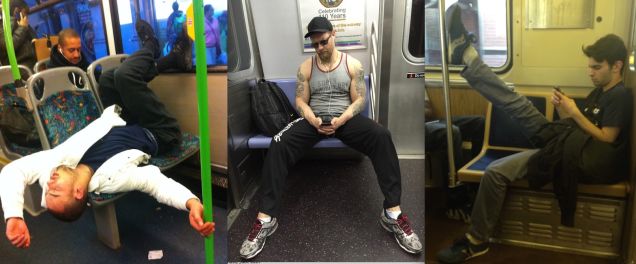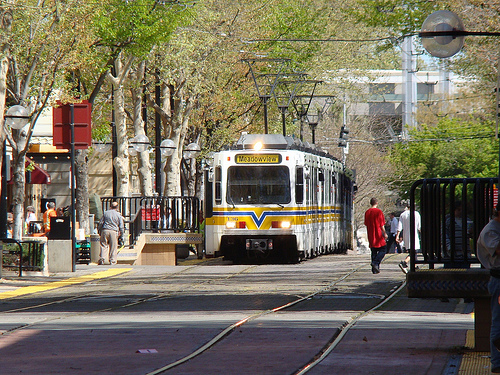On the heels of the Sacramento Taxpayer Association awarding the bankrupt Sacramento Regional Transit its annual GOLDEN FLEECE AWARD, the Sacramento Bee published a story claiming Regional Transit “may be better than you think.” Rather than acting like a watchdog on government, the Bee appears to be the Public Relations firm of RT.
GOLDEN FLEECE AWARDs are bestowed upon public officials, governmental agencies and organizations for their “wasteful, ridiculous, or ironic use of taxpayers’ money.” The SacTax FLEECE AWARD went to the entire Board of Directors of Sacramento Regional Transit, for raising bus and light rail fares to the highest level in California, after first proposing the highest fares in the entire nation. RT managers have defended the rate increases because of RT’s of growing deficits, and declining ridership – so they want to increase the fares. Such brilliance is only evident in politics, where politicians respond not to market forces, but instead to political forces. (see below for RT Board)
What business that few people want raises its prices?
RT board also said they risk losing state funding because the subsidy per ticket is so high, each rider’s fare currently contributes only about 21 percent to the cost of his or her trip. The state requires that rate to be at least 23 percent. Perhaps all of the state government employees currently enjoying the 75 percent discounted fares could pay the full fare, since they are actually working at well-paying jobs and have overly generous benefits.
Under RT’s plan, single-ride tickets would increase from $2.50 to $3, daily passes from $6 to $7.50 and monthly passes from $100 to $125, KCRA reported.
The Regional Transit board also pushed for a bailout through voter approval of a doubling of the current ½% Measure A county-wide, transportation sales tax, a proposal that’s likely to be on the November ballot. They want more money, rather than taking the fiscally prudent steps to rein in RT’s escalating operating costs.
As Eye on Sacramento pointed out in a recent report on RT, this is fundamentally a false choice between huge fare hikes, which could trigger a transit death spiral, on the one hand, and doing nothing to address RT’s very real financial crisis, which will lead to bankruptcy.
The Bee Loves RT
“Sacramento’s overall score – which looks at access to jobs, frequency of service and connectivity – ranks No. 27 out of 68 California cities with a population of more than 100,000, ahead of San Diego and San Jose,” Sacramento Bee Associate Editor Foon Rhee wrote.
The study they cite is by liberal “sustainability” group Center for Neighborhood Technology and TransitCenter, of Chicago, funded by activist liberal foundations.
“Sacramento Transportation Authority board looked at two financing plans, one that would give 29 percent of the sales tax revenue to RT and other regional transit expansions and operations, another that would set aside only 21 percent,” Rhee wrote. “The board couldn’t decide, so it plans to vote Thursday on a compromise endorsed this week by a subcommittee that would aim 26 percent to regional transit systems.”
Rhee takes it one step further and advocates for “consolidating” (government takeover) of all transit systems in the region – because RT is doing such a great job?
The commuter buses which travel from Elk Grove and Galt, El Dorado, Placer, Yolo and Yuba counties into downtown Sacramento, are a far more efficient use of transit, because they are using buses instead of trains.
“I get the politics and desire for local control, but it’s never made much sense to me why we need all these different transit providers,” Rhee said. “There has to be at least some efficiency and savings from consolidating.”
What Rhee is proposing is just a larger mismanagement, larger fiscal irresponsibility and a larger Regional Transit bankruptcy, as well as spoiling the services from outlying areas.
Rhee should have instead asked for a ranking based on the size of the deficit and how much money light rail systems lose every year.
Taxpayers Gouged
Why would taxpayers want to give Regional Transit one more penny when they’ve mismanaged and squandered the resources they already receive? More public spending for Regional Transit will likely result in little to no improvements for riders, but will swell transportation deficits and waste tax revenues.
RT’s current financial mess is of their own making: Their “premature and reckless expansion of light rail lines and extensions which have saddled RT with $4 million of annual debt payments and about $7 million of additional annual operating costs, despite an early warning from the federal government that RT might not be able to afford to operate its light rail extension,” EOS found. “A secondary cause has been RT’s failure to gain control over its staffing decisions under in its labor contracts with its unions. Failure to control its compensation and benefit costs has also played a role.”
RT needs to take immediate and focused action to reduce its growing operating costs without substantial cuts to RT service levels. It is this “third way” which is the focus of EOS’s report, which identifies dozens of opportunities for RT to reduce its costs – so long as both the RT board and its management marshal the political will to take advantage of them. Any other road forward (record-setting rate hikes or doing nothing) would put RT on a glide path to likely disaster.
Eye on Sacramento has proposed numerous ways in which RT can close its deficits by cutting costs without significant cuts to service levels:
Aggressively explore options to outsource all RT functions
Mothball the lightly used, one-stop Green Line to Township 9 for now
Don’t build the proposed streetcar which will saddle RT with $5- 8 million in net annual operating costs, or about $180 million in new costs over 30 years
If the streetcar is built, insulate RT from cost liabilities by insisting that participating cities and property owners pick up the tab for operating it
Stop using high-cost bond proceeds to finance its projects
Secure reimbursement from Kings for RT’s $6 million cost of Downtown station rehabs, as well as commitment to cover maintenance/cleaning costs
Take assertive action to control its labor costs by canceling recent pay hikes
Eliminate very costly and efficient work rules under RT’s labor contracts so RT can use low-cost part-time workers and less costly work schedules
Terminate its pricey management consulting contract with Doug Carter
Engage an independent, outside law firm to negotiate RT’s labor contracts
Implement reforms of benefit plans to reduce costs and share risks
Fix RT’s chronic absenteeism by imposing real consequences for abuse
Put RT’s very high-cost contract with Paratransit, Inc. out to bid
Drop special bus routes for city schools unless SCUSD reimburses RT’s costs
Suspend planning and environmental work on airport extension for now
There is also an opportunity to outsource all electrical maintenance and repairs to SMUD, at tremendous savings.
Regional Transit was a successful public transit system before it decimated the bus lines with Light Rail, and intersected major artery streets with rail tracks. “They should consider that proven, affordable rapid transit is available in the form of Bus Rapid Transit (BRT) for a fraction of the cost of light rail,” the NCPA reports. “BRT allows buses to operate more like a rail system, using separate highway lanes. Best of all, because its capital costs can be partially offset by automobile user fees, it could actually be built now, without raising taxes or waiting decades for funding to appear.”
It is important to also note that SacTax awarded the Sacramento City Council 2nd Runner Up and STA’s ANNUAL HUBRIS AWARD for blatantly ignoring the clear will of city voters who soundly rejected a tax assessment in Downtown/Midtown to pay for a circulating streetcar system by a vote of 56% “NO” to 46% “YES” (the special tax required a 2/3rds “YES” vote to pass). The City didn’t miss a beat in pursuing a “Plan B” strategy to build the streetcar project anyway.
Read the EOS report: Avoiding Both Bankruptcy and a Transit Death Spiral
Download the Report – Executive Summary
These are the members of the Sacto Regional Transit Board – all elected regional city council or county supervisors: Linda Budge, Steve Hansen, Jeff Harris, Pat Hume, Rick Jennings, Roberta MacGlashan, Steve Miller, Andy Morin, Don Nottoli, Jay Schenirer, Phil Serna. Constituents can contact them about this issue – HERE
Katy Grimes is the President of the Sacramento Taxpayers Association



